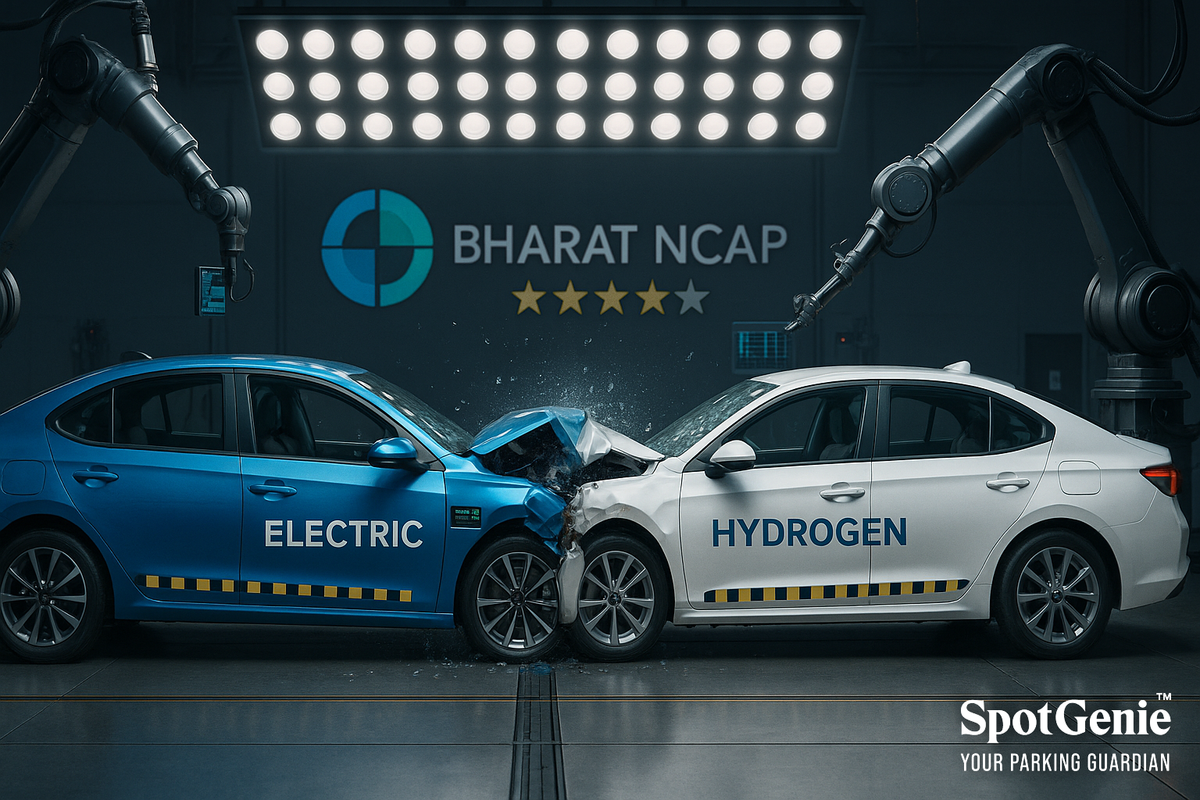Bharat NCAP to Begin EV & Hydrogen Car Crash Testing from October 2025 | SpotGenie Gyaan
Bharat NCAP will include electric and hydrogen car safety crash tests starting October 2025. What it means for you in today’s SpotGenie Gyaan.

SpotGenie Gyaan: EVs and Hydrogen Cars to Face Bharat NCAP Crash Tests from October 2025 – Safety for the Future Starts Now
SpotGenie's Opening Whisper
🧞♂️ Electric and hydrogen cars promise a cleaner tomorrow — but are they safe in a crash today? India is ready to find out. From October 2025, Bharat NCAP will begin officially crash-testing electric vehicles (EVs) and hydrogen-powered cars, making India one of the few nations to extend safety certification across emerging fuel platforms. Let’s charge into what this means for your next vehicle purchase.
Latest Regulatory Update
As part of a progressive expansion, Bharat NCAP (New Car Assessment Programme) will begin safety testing for:
- Electric Vehicles (EVs): Battery electric cars, crossovers, and commercial EVs
- Hydrogen Fuel Cell Vehicles (FCEVs): A growing segment with pilot models by Hyundai and Toyota
The testing begins in October 2025 and will follow upgraded protocols to evaluate new-age risks specific to EVs and FCEVs. These include:
- Structural integrity during side and frontal impact
- High-voltage battery fire resistance
- Post-crash isolation of electrical components
- Thermal runaway protection and hydrogen leak resilience
- Adult and Child Occupant Protection (AOP & COP scores)
Keywords: Bharat NCAP EV testing, Hydrogen car crash test India, October 2025 auto safety update, AOP COP electric vehicle safety
What It Means for You
EVs are no longer fringe technology — they’re mainstream. But safety data for electric platforms has remained limited in India. With Bharat NCAP stepping in, you’ll soon see familiar star ratings on the windshields of EVs and hydrogen cars, just like petrol or diesel models.
This improves buyer confidence, insurance transparency, and resale value. Whether you're buying a Tata Nexon EV, Mahindra XEV 9e, or a futuristic hydrogen model — you’ll now know exactly how it fares in a real-world impact scenario, verified by a government-endorsed agency.
The Deeper Jam
Urban India is moving to low-emission mobility — but that doesn't mean safety should trail behind. With crash data now available across powertrains, fleet buyers, public agencies, and private consumers can make better-informed decisions. And this aligns with global trends: Europe, Japan, and Korea already require crash-tested EVs before sale.
India’s NCAP update also encourages automakers to build more structurally robust zero-emission vehicles with globally competitive safety standards. From battery enclosures to cabin deformation metrics, every element will now be scrutinized — and improved.
SpotGenie's Daily Gyaan
“Clean power needs clean accountability.” EVs aren’t just electric — they must be ethically engineered for survival too. 🧞♂️🔋🚗
SpotGenie:
SpotGenie may not conduct crash tests, but it builds safety into the everyday. As India welcomes EVs and hydrogen cars, SpotGenie supports real-time accountability at street level — from nudging misparked EVs to alerting unfit vehicles or blocked chargers. Civic participation and intelligent tech work hand in hand for a safer road experience.
Explore SpotGenie’s Civic-Tech Platform
Trending Regulations & Sections
- Bharat NCAP EV/FCEV Protocol 2025: Official test standards for electric and hydrogen vehicle safety
- Automotive Safety Compliance Act 17A: Battery fire, leak, and post-crash electronic disconnection mandates
City Focus: Today’s Urban Lens
Bengaluru, Pune, and Delhi NCR — India’s early EV capitals — are expected to be at the forefront of this new crash test rollout. Several dealerships are preparing for October 2025 certification batches, and manufacturers like Tata, Mahindra, and Hyundai have begun submitting EVs for early protocol alignment.
Voices from the Road
"Finally, EVs get crash tests too — we needed this data long ago."
— @SafeDriveIN (Twitter)
"Good step. I’ll wait for the hydrogen car NCAP stars before buying one."
— Reddit user: RangeAndRescue
Your Move, India
If you're planning to buy an EV or a hydrogen car in 2025 or beyond, wait for the Bharat NCAP rating label. It could help you choose wisely — not just on specs, but on safety. Share this SpotGenie Gyaan and spread the word that smart driving starts before the engine even starts.
SpotGenie’s Sign Off
🧞♂️ Innovation must meet impact. Until next time — test smart, drive smarter. #SpotGenieGyaan #GenieKnows
Follow us on:
🅾 Instagram |
ⓕ Facebook |
𝕏 X |
▶️ YouTube |
🟢 WhatsApp



